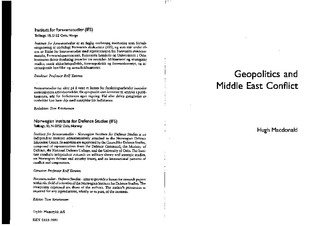| dc.description | This region ought to be the archetype for Globalisation. Recent regional economic development has demonstrated its potential, in trade, tourism, commercial development, and as an archaeological reservoir of incredible importance. Yet balanced development appears precluded by heavy arms spending and other preparations for war; systemic lack of fresh water; the politics of energy supplies; and the spread of WMD, criminality and the influences of rising new centres of power.
With the end of the Cold War, and the Oslo Agreements of 1993 and 1995, Israel recognised the legitimacy of Palestinian claims to self-determination, and the Palestinians promised future reciprocity, subject to those claims being met. Talk of a ‘new’ Middle East flowered. But it gradually withered and eventually expired after the failure of the Camp David II talks of July 2000. Today, a renewed Intifada is supported by forces of Islamic renewal throughout the region. | no_NO |
